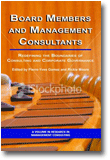
Board Members and Management Consultants
Redefining the Boundaries of Consulting and Corporate Governance
Edited by:
Pierre-Yves Gomez, EM LYON Business School
Rickie Moore, EM LYON Business School
A volume in the series: Research in Management Consulting. Editor(s): David Brian Szabla, Western Michigan University.
Published 2009
Boards and Management Consultants, the eighth volume in the Research in Management Consulting series, explores the growing complexity associated with the growing demands on boards of directors and the challenges raised by evolving expectations of what constitutes "good" governance. As a way of better understanding the ramifications for management consulting, particular—and timely—emphasis is placed on the evolution of expectations and needs in relation to boards and their operation.
The chapter authors, as noted above a truly international group of experts, more than succeed in raising the reader’s awareness of the consequences that the evolving nature of corporate boards are having on the function of directors, how this function is being redefined by the players themselves—and what all of this change means for consultants and the realm of management consulting. Significant questions are raised and explored throughout the volume, from the extent to which these changes will lead to new social, moral, ethical, and professional challenges and opportunities, to how the relationships between consultants and their traditional clients—managers, administrators and employees—might evolve. As management consultants become more actively involved in governance issues, their role will clearly change, but will such changes enhance or constrain the role they have traditionally played in organizations?
CONTENTS
Preface, Anthony F. Buono. Introduction, Pierre-Yves Gomez and Rickie Moore. PART I: THE NEW EXPERTS: RISING EXPECTATIONS TOWARDS DIRECTORS. Behind the Boardroom Doors: Changes Underway in U.S. Corporate Governance Post Sarbanes-Oxley, David Finegold and Edward Lawler, III. The Increasing Role Professional Service Firms Play in the Reform of Shareholders' Meetings, Jose Luis Alvarez and Joan E. Ricart. Why Don't More Investor Representatives Sit on Boards of Publicly Traded Companies? Harry Korine. PART II: DEFINING THE BOUNDARIES OF THE NEW EXPERTISE. How Can Corporate Directors Better Protect Themselves?: Lessons From Litigation In the United States, Xavier de Sarrau and Thierry Tomasi. Bounding the Role of the Director, Gavin J. Nicholson, Geoffrey C. Kiel, and Kevin P. Hendry. Expectations of a Consultant in Corporate Governance, David Risser. PART III: "SUPER" MANAGER OR "SUPER" CONSULTANT? THEORIZING THE ROLE OF THE DIRECTOR. Knowledge and Accountability: Outside Director's Contribution in the Corporate Value Chain, Morten Huse, Jonas Gabrielsson, and Alessandro Minchilli. The Question of Motivation of Nonexecutive Directors, Pierre-Yves Gomez and David Russell. Crowding Out of Trust and its Impacts on Management Consulting, Michael Nippa and Jens Grigoleit. PART IV: A NEW PROFESSION: THE CONTRACT, THE RESPONSIBILITIES, AND THE FUTURE. Enabling or Facilitating Discriminatory Board Practices in Board Appointments: Where Are the Women? Susan Adams How Sarbanes-Oxley is Transforming Board Rooms and Consulting: Intended Effects and Unintended Consequences, Rickie Moore. About the Authors.
-
Paperback978-1-59311-805-1
Web price: $45.04 (Reg. 52.99)
-
Hardcover978-1-59311-806-8
Web price: $80.74 (Reg. 94.99)
- eBook9781607521822

- BUS071000 - BUSINESS & ECONOMICS: Leadership
- BUS041000 - BUSINESS & ECONOMICS: Management
- BUS075000 - BUSINESS & ECONOMICS: Consulting
-
 Consultation for Organizational Change Revisited
Consultation for Organizational Change Revisited
-
 Digital Transformation
Organizational Challenges and Management Transformation Methods
Digital Transformation
Organizational Challenges and Management Transformation Methods
-
 Intervention Research
From Conceptualization to Publication
Intervention Research
From Conceptualization to Publication
-
 La Recherche-Intervention Dans les Entreprises et les Organisations
La Recherche-Intervention Dans les Entreprises et les Organisations
-
 Management Consulting in the Era of the Digital Organization
Management Consulting in the Era of the Digital Organization
-
 Strategic Engineering of the Reed
Reflections on Socio-Economic Strategy and Implementation
Strategic Engineering of the Reed
Reflections on Socio-Economic Strategy and Implementation
-
 The Socio-Economic Approach to Management Revisited
The Evolving Nature of SEAM in the 21st Century
The Socio-Economic Approach to Management Revisited
The Evolving Nature of SEAM in the 21st Century

